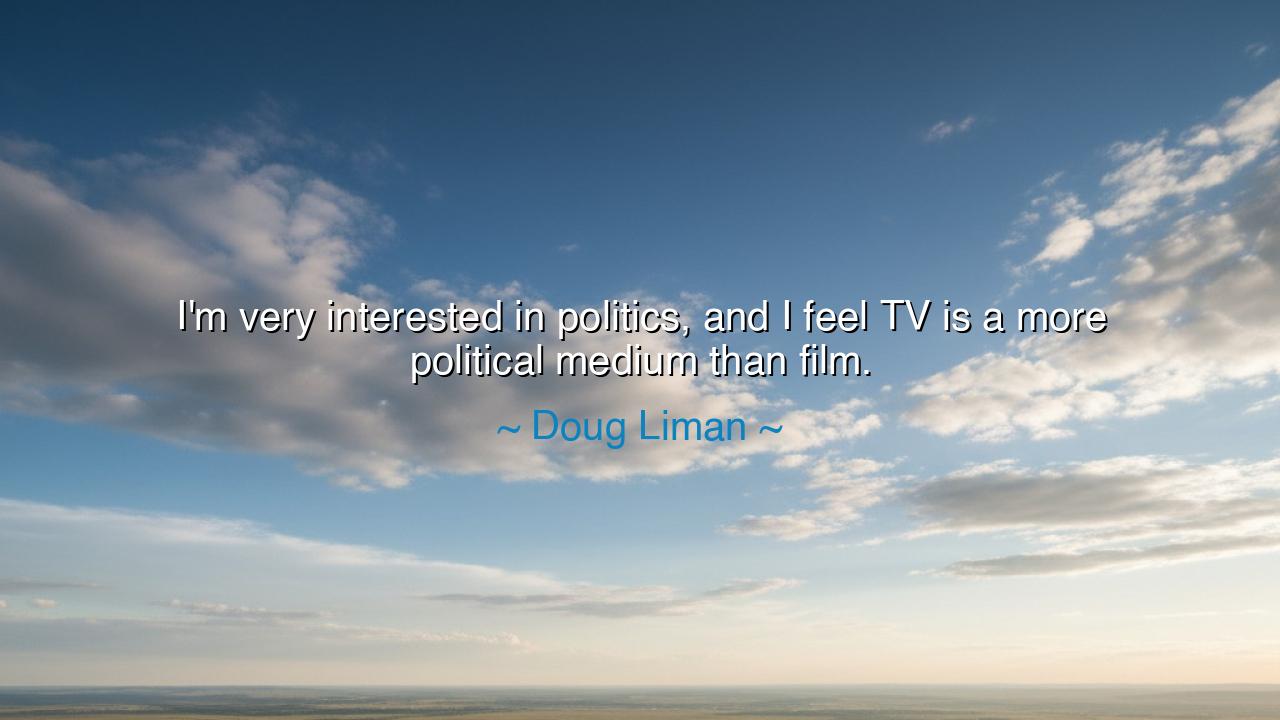
I'm very interested in politics, and I feel TV is a more






Hear the voice of Doug Liman, a teller of stories through the moving image, who declared with conviction: “I’m very interested in politics, and I feel TV is a more political medium than film.” At first, these words may seem to concern only the arts, yet in truth they reveal something much greater: the power of storytelling to shape the minds of peoples, and the different ways that mediums carry influence across the world. For Liman speaks not only as a creator, but as a witness to the ways politics and narrative are forever bound.
For what is politics but the struggle over hearts, minds, and the future of the people? And what is television but the hearth of the modern age, where messages are carried daily into homes, shaping thought not in distant grandeur but in constant presence? Film may dazzle, yes—it may lift us into beauty and spectacle—but it is television that dwells with us, episode after episode, night after night, weaving its voice into the rhythm of our daily lives. Thus Liman calls TV the more political medium, for it does not visit us rarely like the grand procession, but rather abides with us like the constant whisper of an advisor.
History itself gives weight to this claim. Consider the televised debates between John F. Kennedy and Richard Nixon in 1960. Here was not a film upon a screen, but a direct broadcast into the homes of millions. Kennedy’s vigor, his youth, his confidence—these swayed the nation not through argument alone, but through the image repeated across the glowing box. Those who listened by radio thought Nixon had held his ground; those who watched the television were swept by Kennedy’s presence. In that moment, the truth Liman speaks was revealed: television is the arena where politics truly plays its fiercest games.
Contrast this with film, which often lifts us into timeless parables. A film may critique a system or portray injustice—consider Mr. Smith Goes to Washington or Schindler’s List—but its reach is different. It is a journey one chooses to make, a two-hour pilgrimage into a crafted world. Television, however, is woven into habit. It shapes the citizen subtly and daily, reinforcing beliefs or challenging them week after week. That is why Liman declares it more political: its influence is continuous, familiar, and therefore deeply powerful.
There is also a lesson here about the intimacy of mediums. Film, vast and theatrical, speaks in thunder; TV, smaller and constant, speaks in whispers. Yet which voice moves the soul more deeply? The thunder may inspire for a moment, but the whisper, repeated night after night, reshapes the heart. Politicians, activists, and leaders have long understood this: the soap opera, the nightly news, the political satire—all of these enter the home, lodge in the mind, and sculpt thought as surely as laws themselves.
The lesson, then, is this: beware and respect the power of the medium that enters your home daily. Do not dismiss television as mere entertainment, for it carries messages, values, and visions that shape the politics of entire nations. Where film may light the torch of outrage or beauty, television tends the slow fire of belief. Those who would be free must not only watch but also discern, asking: What politics is hidden in this story? What vision of life is it urging me to accept?
In practice, this means: be mindful of the stories you consume. Know that every show, every broadcast, carries not only drama but also ideology. Teach yourself and others to see beyond the surface, to question, to understand the power of repeated messages. And if you are a creator, let your stories carry truth and not manipulation, service to humanity and not chains upon the mind.
So let Liman’s words be remembered: “TV is a more political medium than film.” In this age, the true battleground is not only in the halls of government, but in the screens of our homes. He who shapes the story shapes the people. And he who shapes the people, in the end, shapes the world.






TPNguyen Thien Phuoc
This quote really speaks to how television has become a key space for political commentary, especially with its long-form storytelling. But I’m curious, is the political impact of TV always positive? With so much political content out there, does TV ever sensationalize or oversimplify complex political issues? Could the constant news cycle and fictionalized portrayals of politics be doing more harm than good in how people view the political system?
LDLop 10A10_06_Cao Le Dung
Liman’s statement really got me thinking about how TV has evolved in terms of political influence. With shows like *The West Wing* and *House of Cards*, TV has become a platform for reflecting and shaping political conversations. But in comparison, can film still play a meaningful role in politics, especially given the rapid pace of media consumption today? Does TV have a unique advantage because it can tackle issues over multiple seasons?
KLPHAN THI KHANH LINH
I find it interesting that Liman considers TV more political than film. With the rise of political dramas and the influence of 24-hour news cycles, I can understand his perspective. But doesn’t film have a longer history of making bold political statements, especially with iconic films like *Dr. Strangelove* or *The Great Dictator*? Can TV really outpace the political impact of film, or is it just more timely due to the format’s immediacy?
STSon Tran
Liman’s view on TV being more political than film is intriguing. I can see how TV, with its serialized nature, allows for more in-depth exploration of political themes, especially when it comes to real-world issues. But does that mean film can’t tackle political issues as effectively? Are we simply seeing a shift in how media formats address politics, or is TV becoming a more accessible platform for political discourse in general?